unit 1 some strategies
- 格式:ppt
- 大小:3.42 MB
- 文档页数:58

⼤学英语精读第1册unit1教案College English One-- Intensive Reading 1College English(I) Teaching GroupDepartment of Foreign Language Teaching and Research Yangtze Normal UniversityUnit 1 Some Strategies for Learning EnglishIntensive readingObjectives:1. Understanding the main idea2. Understand the structure3. Learn related terms4. Master the key language points and grammatical structures in the text.5.Conduct a series of speaking and listening task based on the textTeaching focus:1.Learn to understand the strategies for English Leaning2. The understanding reading skillsPre-reading Tasks1.Warming up activitiesPair work/ group work: students work in pairs or groups to discuss their opinions about the following topics.1. When did your story of learning English start off?2. Do you enjoy learning English? Why?I enjoy learning English, because I find it very interesting. First, in my opinion, English isa beautiful language, including its pronunciation and shape. I enjoy speaking and listening to it.3. Do you have any trouble learning English?4. Do you think it useful to learn English with the help of some strategies?5. What strategies do you think can be employed in English learning?6. What do you think is the most effective way of learning English?As far as I am concerned, seeing English movies is the most effective way of learningEnglish. I choose those movies that I have great interest in, such as cartoons. For each movie, Iwill see at least three times—without subtitles, with Chinese ones and with English ones. And atthe same time speak loudly after the characters. Though enjoying movies, I make considerable progress in English.2. Information related to the text.English as an International LanguageWorldwide over 1.4billion people live in countries where English has official status. Oneout of five of the world’s population speaks some English. Over 70% of the world’sscientists read English. About 85% of the world’s mails written in English, and 90% of allinformation in the world’s electronic retrieval systems is stored in English.Language learning strategiesLanguage learning strategies are used by learners to complete speaking, reading, vocabulary,listening and writing activities presented in language lessons. Recognizing that there is a task tocomplete or a problem to solve, language learners will use whatever strategies they possess toattend the language-learning activity.Possible language learning strategies include: using practice opportunities, self-evaluation, selective attention, time management, reviewing notes taken in class and checking one’s understanding, constantly seeking answers to questions instead of passively receiving information, etc.Active vocabulary and passive vocabularyActive vocabulary consist of the words you use frequently and comfortably in speaking and writing, while passive vocabulary consists of the words you recognize when you read and listen. Input-output balance theory in language learningInput in language learning refers to information read, seen or heard by the learner, while output refers to what the learner produces in writing and speaking. The input-output balance theory in language learning believes that one can learn a language well through maintaining abalance between input and output.English is not Real English.Skimming and scanningGlobal Reading1. Parts division of the textPart Ⅰ(Paras. 1-2) Introduce globally that while learning English is not easy, there are stillsome helpful strategies.Part Ⅱ(Paras. 3-8) Introduce six helpful strategies in detail.Part Ⅲ(Para. 9) Conclude that language learning is a process of accumulation.2. SummaryLearning English is not easy, but there are still some useful strategies that we can use to make it easier. The text introduces six strategies concerning vocabulary, idioms, listening, speaking, reading and writing, and these strategies cover the basic and important points in English learning. The text also tells us that language learning is a process of accumulation. It is worthwhile for us to take in as much as we can from reading and listening and then put them into practice through speaking and writing.3. Decide whether the following statements about the text are true or false.1) Language learners should memorize all the new words. (F)While active words demand constant practice and memorization, words that do not often occur in everyday situations require just a nodding acquaintance.2) It’s impossible to cram too many words into your head at a time.(T)3) he meaning of a word and the way native speakers use it are equally important.(T)4) Listening to English occasionally will improve your ear and speaking skills. (T)5) It’s important to catch every detail in English listening comprehension. (F)The first time one may not catch a great deal, but with each repetition one will get something more.6) Language learners do not find many opportunities to practice oral English at school.(T)4. Discourse AnalysisA strategy refers to a set of carefully planned methods for achieving something that is difficult and may take a long time. In introducing some strategies, the author adopts the structure of Problem—Strategy within a paragraph to show us the problems in English learning and then proposes strategies to solve5. What strategies do you think can be employed in English learning?Suggested Strategies:Make your own oppotunities for practice in using the language inside and outside the classroom.Specific ways:1)ask your teacher questions before, during and after class.2)speak to a foreigner3)listen to an English radio program.4)watch an English movie.5)read an English article on the Internet.6)use English software.While-reading TasksText Learning1.Explain the skill of skimming and scanning2.Ask student to skim the text to have a general idea about the text.3.Underline the difficult words and sentences and answer the questions on page 74.Expalin the text5.Ask students to sum up the good habit mentioned in the text and learn them by heart in the class./doc/441b44ebf4335a8102d276a20029bd64783e6290.html nguage points and structureNew words and expressions1. strategy: n. the act of planning and managing operations over a long period.Example: It’s a long way for our government to develop a strategy for dealing with unemployment.★tactic: n. 战术tactical: adj. 战术的strategy: n. 战略strategic: adj. 战略的Our strategy is “to pit one against ten”, while our tactic is “to pit ten against one”. 我们的战略是“以⼀当⼗”,我们的战术是“以⼗当⼀”。
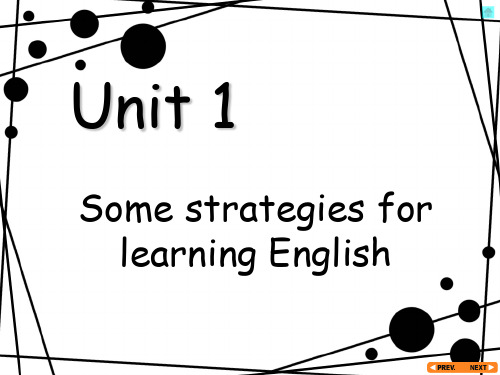
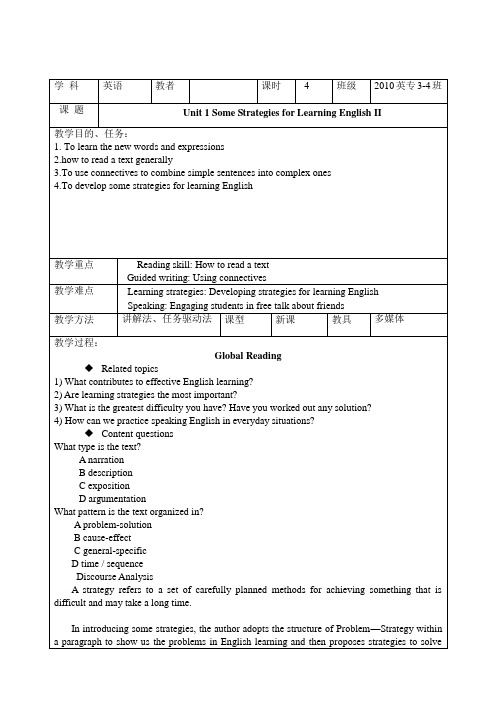
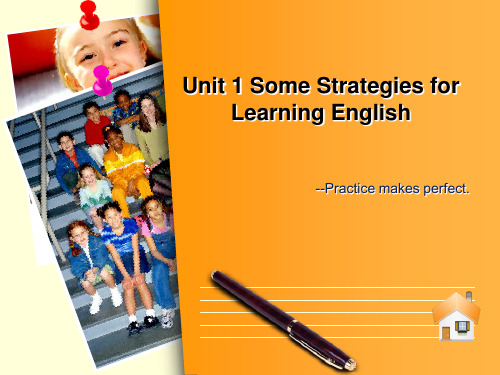
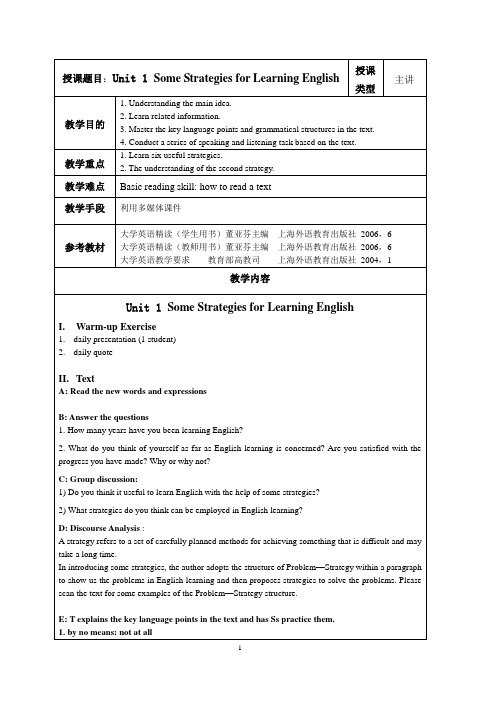
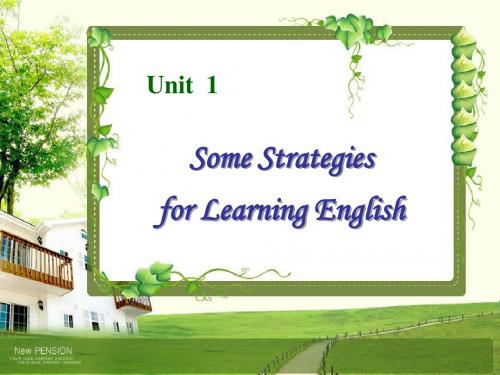
Unit 1 Some Strategies for Learning EnglishLearning English is by no means easy. It takes great diligence and prolonged effort.学习英语绝非易事.它需要刻苦和长期努力.Nevertheless, while you cannot export to gain a good command of English without sustained hard work, there are various helpful learning strategies you employ to make the task easier. Here are some of them.虽然不经过持续的刻苦努力便不能期望精通英语,然而还是有各种有用的学习策略可以用来使这一任务变得容易一些.一下便是其中的几种.1. Do not treat all new words in exactly the same way. Have you ever complained about your memory because you find it simply impossible to memorize all the new words you are learning? But, in fact, it is not your memory that is at fault. If you cram your head with too many new words at a time, some of them are bound to be crowded out. What you need to do is to deal with new words in different ways according it how frequently they occur in everyday use. While active words demand constant practice and useful words must be committed to memory, words that do not often occur in everyday situations require just a nodding acquaintance. You will find concentrating on active and useful words the most effective route to enlarging your vocabulary.不要以完全相同的方式对待所有的生词。